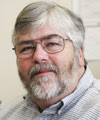 (Originally published as a column in the Sunday, Jan. 18 Columbus Ledger-Enquirer.)
(Originally published as a column in the Sunday, Jan. 18 Columbus Ledger-Enquirer.)Exactly 40 years ago Tuesday, a teenage boy stood on a crowded Washington street and saw
Richard Milhous Nixon inaugurated as the 37th president of the United States.
“Saw” is actually a gross exaggeration. My vantage point was the inaugural equivalent of nosebleed seats, although “seats” isn’t accurate, either. I was close enough to distinguish the unmistakable Nixon features, but that doesn’t say much; Nixon was recognizable from space.
I remember little if anything of his inaugural address. My most vivid memories of that long-ago day are of overcast and cold, and of the crazy street theater the occasion provi

ded. America was a wild and woolly place in 1969, and nowhere was it wilder or woollier than in its capital city, even when it wasn’t inauguration day. The scene
in “
Forrest Gump” where Abbie Hoffman screams incoherent obscenities to cheering mobs on the mall is a pretty faithful depiction of D.C. on pretty much any day in the late 1960
s.
I went online to find what history has recorded
about that day, and what Nixon said that I had so totally forgotten.
TIME magazine’s
Jan. 17, 1969 issue forecast “unseasonably balmy weather” for Inauguration Day. Is my memory that bad? Is my most vivid recollection completely wrong? (No. The forecast was. It was 35 and cloudy.)
“The mood of Inauguration 1969,” TIME opined, “is neither the bleak desperation of 1933, when Franklin Roosevelt succeeded Herbert Hoover amid the Great Depression, nor the partisan exhilaration of 1965, after Lyndon Johnson had been elected in his own right.”
So what about the mood of Inauguration 2009? Certainly there’s plenty of “partisan exhilaration” among Democrats, who have been mostly wandering in the wilderness for eight years. But if you had to put your Mood of the Country chip somewhere between 1933 and 1965, the smart money would be on the low side.
Nixon’s speech began this way:
“I ask you to share with me today the majesty of this moment. In the orderly transfer of power, we celebrate the unity that keeps us free.
“Each moment in history is a fleeting time, precious and unique. But some stand out as moments of beginning, in which courses are set that shape decades or centuries.
“This can be such a moment.”
I have no memory of that eloquent introduction, but given the arc of Nixon’s career, there’s an almost poignant irony in it now. His swearing-in was, as it turned out, indeed a moment in which courses were set that shaped both a decade and a century.

He would ultimately resign in scandal and shame, done in by his own paranoia and an apparent need to destroy foes, real or imagined, rather than just defeat them. The
last public memory of Richard Nixon is the humiliating image of his grimaced grin as he waves victory signs from the boarding steps of
Marine One before flying off into secluded ignominy.
Nixon has largely been forgiven by history, thanks to the smoothing effect of time; to a belated acknowledgement of the lasting value of his achievements, especially in foreign policy; and — I have absolutely no doubt of this — to the wreckage left by his current successor.
It was Nixon who ultimately extricated us from a war many still believe claimed Lyndon Johnson as one of its last casualties. And it is Nixon who probably deserves most of the credit for ending the Cold War, an achievement for which Reaganauts would claim gleeful credit two decades later.
In “
Going Too Far,” a book about the early days of the aggressively irreverent and hilariously tasteless National Lampoon, author and former Lampoon editor Tony Hendra offers a technically inaccurate but convincing definition of The Sixties. He brackets that mythical and mostly misdiagnosed epoch within the years 1963-1974 — from Kennedy’s assassination to Nixon’s resignation. By that standard, the dominant figure of the decade, and perhaps of the last half of the century, would indeed be Richard Nixon.
One phrase from an online transcript of Nixon’s speech did ring a rusty bell, although whether I actually recall it from that day or have just encountered it somewhere since, I can’t honestly say: He spoke of the country having endured “
a long night of the American spirit.”
Forty years later, I have occasion to applaud.
***

 your pledge and become a member. For just a $20 contribution we’ll send you a Grateful Dead poster featuring high-resolution pictures of the band, including the late Jerry Garcia and all three dead keyboard players; a $60 pledge gets you 12 hours of Carl Sagan’s historic ‘Cosmos’ series in the equally historic Beta videotape format; and for a pledge of $120 or more you’ll receive the 12-CD complete works of Yoko Ono.”
your pledge and become a member. For just a $20 contribution we’ll send you a Grateful Dead poster featuring high-resolution pictures of the band, including the late Jerry Garcia and all three dead keyboard players; a $60 pledge gets you 12 hours of Carl Sagan’s historic ‘Cosmos’ series in the equally historic Beta videotape format; and for a pledge of $120 or more you’ll receive the 12-CD complete works of Yoko Ono.”





















